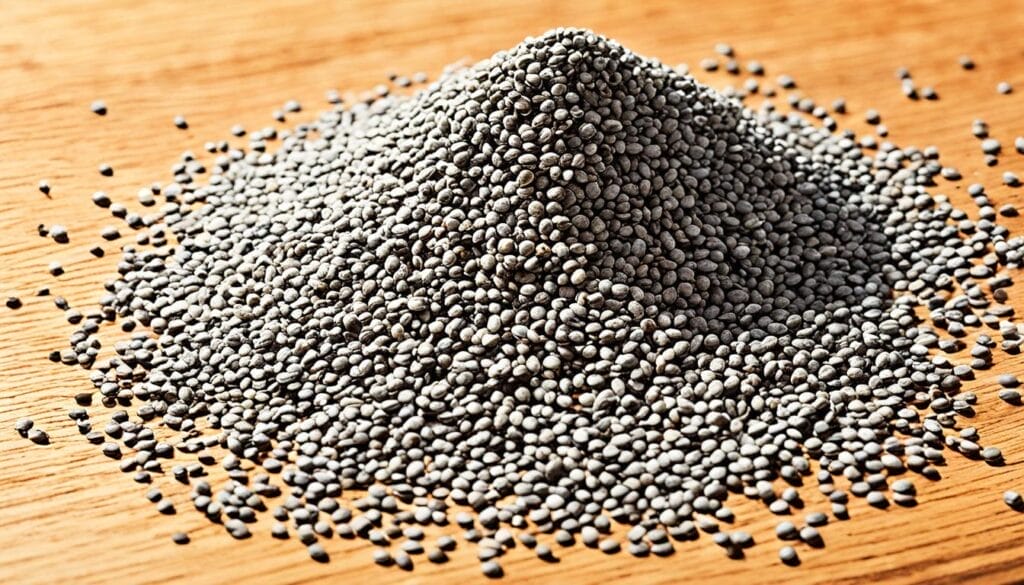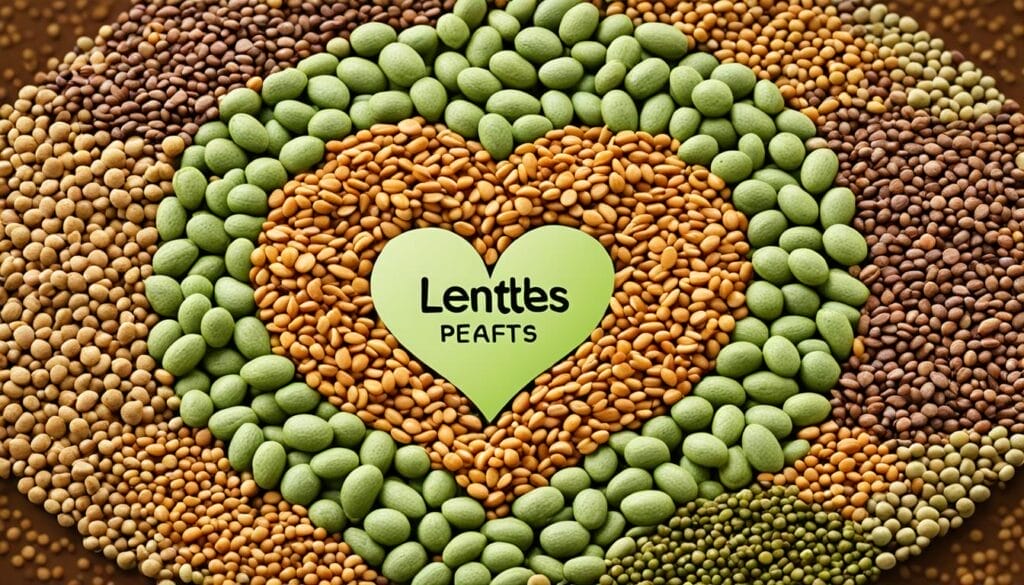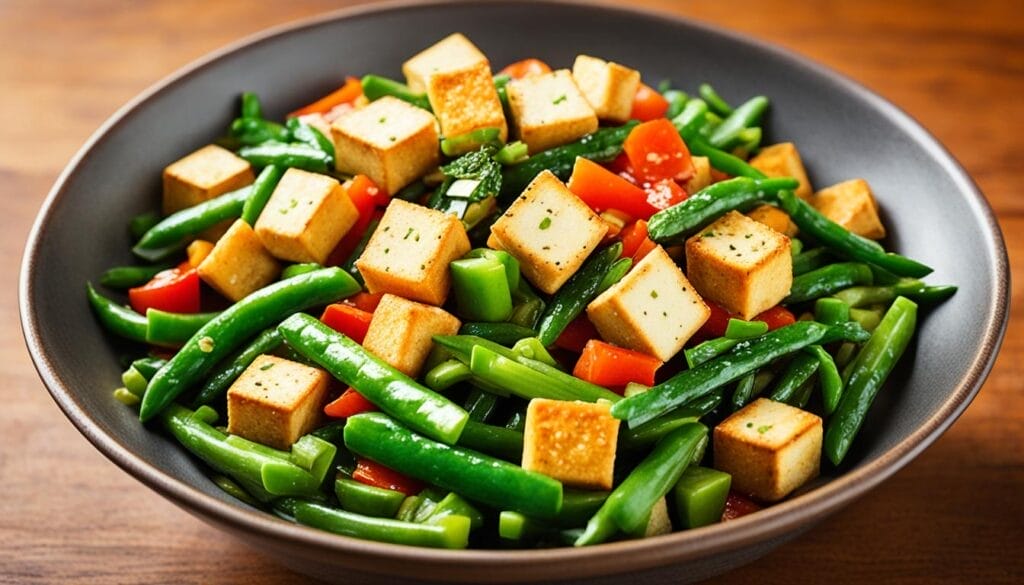More and more people are embracing vegan and vegetarian diets, but finding complete protein sources can be a challenge. Consuming a variety of plant-based protein foods throughout the day is essential to meet nutritional needs and support fitness goals.
Vegan protein sources are not just for vegans; they offer a range of nutrients and can benefit everyone. Protein is an essential macronutrient that supports various functions in the body and is an important building block for muscle, skin, and other tissues.
Let me share a personal story that highlights the importance of vegan protein sources in my fitness journey.
A few years ago, I was an avid gym-goer, always striving to build muscle and improve my overall fitness. As a vegetarian at the time, I struggled to find meat-free protein alternatives that would fuel my workouts and aid in muscle recovery. I relied heavily on dairy products like milk and cheese, but I wanted to explore vegetable protein options for a more ethical and sustainable approach.
One day, a friend recommended incorporating more cruelty-free protein sources into my diet. They mentioned the benefits of vegan protein-rich foods and how they could provide me with the protein I needed, without relying on animal products. Intrigued, I decided to give it a try.
My journey into exploring sustainable protein sources began, and I discovered a whole new world of plant-based protein options. Quinoa became my go-to grain, packed with complete protein and versatile enough to substitute for pasta or rice in my favorite dishes. Chia seeds became my tiny nutritional powerhouses, adding a protein boost to my overnight oats and smoothies. Chickpeas and lentils became my nutrient powerhouses, providing me with a solid dose of protein and essential micronutrients.
By incorporating these animal-free protein options into my diet, I not only experienced improved muscle recovery and strength but also felt more aligned with my ethical choices. I realized that vegan protein sources had a positive impact not only on my fitness journey but also on my overall well-being.
So, whether you’re a vegan, vegetarian, or simply looking to make more sustainable and ethical protein choices, exploring vegan protein sources can be a game-changer. They offer a wide range of nutrients, are versatile in recipes, and provide a cruelty-free alternative to traditional protein sources.
Join me as I delve into my top vegan protein sources for fitness, and discover the amazing benefits they bring to the table!
Key Takeaways
- Vegan protein sources offer a range of nutrients and can benefit everyone, not just vegans.
- Protein is an essential macronutrient that supports various functions in the body.
- Finding complete protein sources can be a challenge on a vegan or vegetarian diet.
- Quinoa, chia seeds, chickpeas, lentils, and tofu are excellent vegan protein sources.
- Incorporating vegan protein sources can support muscle recovery, strength, and ethical choices.
Quinoa - The Super Grain
Quinoa is a versatile grain that has gained popularity as a vegan superfood. It is not only a delicious addition to meals but also a fantastic source of vegan protein and other essential nutrients. With its complete protein profile, high fibre content, and array of beneficial vitamins and minerals, quinoa has become a staple for individuals seeking plant-based protein options.
The Power of Complete Protein
One of the standout features of quinoa is its classification as a complete protein. Unlike many other plant-based protein sources, quinoa contains all nine essential amino acids that the body needs to function properly. This makes it an excellent choice for vegans and those looking to incorporate more plant-based protein into their diet.
A Nutrient-Dense Choice
Quinoa is not only rich in protein but also packed with a range of other valuable nutrients. With its high fibre content, quinoa supports digestive health and helps maintain a healthy weight. Additionally, it is a good source of iron, which is essential for transporting oxygen throughout the body, and it contains lysine, an amino acid that plays a critical role in muscle development and repair.
Moreover, quinoa offers magnesium and potassium, which are necessary for maintaining healthy blood pressure and supporting proper muscle function. Whether you are vegan or not, incorporating quinoa into your diet provides a convenient way to enhance your nutrient intake and support overall well-being.
Versatile and Easy to Use
Another reason why quinoa has become so popular is its versatility. From salads to stir-fries and even as a substitute for rice, quinoa can be incorporated into a wide variety of dishes. Its mild, nutty flavour adds a delightful taste and texture to meals, making it a favourite among many.
Incorporating Quinoa into Your Diet
There are endless possibilities when it comes to using quinoa in your meals. Here are a few ideas to get you started:
- Quinoa salad with fresh vegetables, herbs, and a tangy dressing
- Quinoa stir-fry with colorful vegetables and your choice of protein
- Quinoa breakfast bowl topped with fruits, nuts, and a drizzle of honey or maple syrup
- Quinoa stuffed bell peppers for a hearty and nutritious meal
By incorporating this versatile grain into your dishes, you can enjoy the numerous health benefits that quinoa has to offer while adding variety to your meals.
Chia Seeds - Tiny Nutritional Powerhouses
When it comes to superfoods, chia seeds are truly exceptional. Packed with nutrients and boasting a high fibre content, these tiny seeds offer a multitude of health benefits. Whether you’re a vegan looking for plant-based protein or simply seeking to enhance your overall well-being, chia seeds are a fantastic addition to your diet.
One of the standout features of chia seeds is their impressive protein content. With 4g of protein per 25g serving, these seeds provide a valuable source of vegan protein. They can be an excellent option for those following a plant-based diet or anyone looking to increase their protein intake.
But chia seeds offer so much more than just protein. They are considered a superfood due to their high concentration of essential nutrients. Chia seeds are known to promote healthy skin, thanks to their rich antioxidant content. Antioxidants help protect the body’s cells from damage caused by harmful free radicals, resulting in a more youthful complexion.
Furthermore, chia seeds are great for digestive health due to their high fibre content. Fibre aids in digestion and can prevent constipation, promoting a healthy gut. By adding chia seeds to your meals or snacks, you can support your digestive system and maintain regularity.
Ready to incorporate chia seeds into your diet? Consider adding them to overnight oats, smoothies, or baking recipes. These versatile seeds can easily be incorporated into various dishes, providing a mild and pleasant nutty flavour.
“Chia seeds are a convenient and nutrient-dense way to boost your protein intake and support a healthy lifestyle.”
Here are some key benefits of chia seeds:
- Packed with plant-based protein for vegans and individuals looking to increase protein intake.
- Rich in antioxidants, supporting healthy skin and preventing premature ageing.
- High fibre content aids in digestion and promotes a healthy gut.
By including chia seeds in your diet, you can harness the power of these tiny nutritional powerhouses to support your overall well-being and enjoy the many benefits they offer.

Chickpeas - Versatile and Delicious
When it comes to vegan protein sources, chickpeas are a true powerhouse. Not only are they a great plant-based protein option, but they also offer a range of other health benefits. With 7g of protein per 100g, chickpeas are a fantastic addition to any diet, whether you’re a vegan or simply looking to incorporate more plant-based protein into your meals.
One of the most popular ways to enjoy chickpeas is in the form of hummus, a creamy dip packed with flavour and nutrients. But chickpeas are so much more than just a dip. These legumes are versatile and can be used in a variety of recipes, from curries and salads to stir-fries and even desserts like cookies and brownies.
What makes chickpeas even more impressive is their high fibre content. They are an excellent source of dietary fibre, with about 8g per 100g serving. This makes chickpeas a filling and satisfying food choice, helping to support digestive health and regulate blood sugar levels.
But the benefits of chickpeas don’t stop there. They are also rich in micronutrients such as iron, magnesium, and folate, which are essential for overall health and well-being. Chickpeas are a nutrient-dense food that can help provide the body with the necessary vitamins and minerals it needs to function optimally.
| Benefits of Chickpeas | Nutrients |
|---|---|
| Excellent source of vegan protein | Protein |
| Versatile ingredient for various recipes | High fiber content |
| Supports digestive health | Micronutrients like iron, magnesium, and folate |
Including chickpeas in your meals is not only a delicious choice but also a nutritious one. Whether you’re enjoying a hearty chickpea curry or a refreshing chickpea salad, you can feel good about nourishing your body with plant-based protein and a host of essential micronutrients.
So next time you’re looking for a versatile and tasty ingredient, don’t forget about chickpeas. They are a perfect addition to any plant-based or omnivorous diet and can be enjoyed in countless ways. Get creative in the kitchen and experience the wonders of chickpeas for yourself!
Lentils - Nutrient Powerhouses
When it comes to nutrition-packed legumes, lentils are in a league of their own. These small but mighty legumes are not only a fantastic source of vegan protein but also offer a wide array of essential nutrients that can support a healthy diet.
Lentils are a nutrient-dense food, packed with iron, fibre, folate, and magnesium. They provide an impressive 9g of protein per 100g serving, making them an excellent choice for those following a plant-based diet or seeking alternative protein sources.
Iron is essential for carrying oxygen throughout the body and is particularly important for vegans and vegetarians who may have a higher risk of iron deficiency. Lentils are an excellent plant-based source of iron, helping to support energy levels and overall well-being.
The high fibre content in lentils promotes digestive health and can help regulate blood glucose levels. Recent research even suggests that replacing half of your starchy foods with lentils can lead to a remarkable 20% improvement in blood glucose levels, making them an ideal choice for individuals looking to manage their blood sugar.
Lentils also provide a substantial amount of folate, which plays an important role in cell growth and development. Folate is especially crucial for pregnant women as it helps prevent certain birth defects.
Additionally, lentils are rich in magnesium, a mineral that aids in muscle function, bone health, and the production of energy. Including lentils in your diet can ensure you’re getting a good dose of this essential mineral.
Types of Lentils
There are various types of lentils, each with its own unique flavour and texture. Here are a few popular varieties:
- Green Lentils: These lentils hold their shape well when cooked and have a slightly nutty flavor. They are perfect for salads, hearty soups, and side dishes.
- Red Lentils: These lentils cook quickly and tend to become soft and mushy when cooked. They are commonly used in curries, stews, and dals.
- Brown Lentils: These lentils have a mild earthy flavor and are versatile in cooking. They work well in soups, stews, and salads.
Experimenting with different types of lentils can add variety to your meals and help you discover your personal favourites.
| Lentil Variety | Protein Content (per 100g) | Iron Content (per 100g) | Fiber Content (per 100g) | Folate Content (per 100g) |
|---|---|---|---|---|
| Green Lentils | 9g | 1.5mg | 7.9g | 100mcg |
| Red Lentils | 7g | 1.5mg | 3.8g | 47mcg |
| Brown Lentils | 8g | 1.5mg | 7.9g | 150mcg |

I love adding lentils to my meals because they are not only a great source of vegan protein but also provide a wide range of essential nutrients. They add a delicious earthy flavour and hearty texture to soups, stews, and salads. Plus, with their impressive iron, fibre, and folate content, lentils are a smart choice for supporting overall health and well-being.
Tofu - The Soy-Based Protein
When it comes to vegan protein options, tofu is a versatile and nutritious choice. Derived from soy, tofu is a plant-based protein that offers 8g of protein per 100g serving. Not only is tofu packed with protein, but it is also low in calories and carbs, making it a perfect addition to a well-balanced diet.
Tofu is a popular meat substitute, as it can be easily incorporated into various recipes. Whether you’re craving a stir fry, noodles, or a refreshing salad, tofu can be your go-to ingredient. Its mild flavour allows it to absorb the flavours of sauces and spices, making it a perfect addition to any dish.
Benefits of Tofu:
- Rich in vegan protein, providing 8g per 100g serving
- Low in calories and carbs, ideal for those on a low-calorie or low-carb diet
- A versatile ingredient, perfect for stir-fries, noodles, and salads
- A great source of soy, which has been linked to various health benefits
Not only is tofu a great source of protein, but it also offers a range of nutrients. It is an excellent source of calcium, iron, and magnesium, which are vital for maintaining healthy bones and muscles. Additionally, tofu is a good source of essential amino acids and antioxidants, supporting overall health and well-being.
Integrating tofu into your meal plan is easy and delicious. Try adding cubed tofu to your stir-fry for a protein-packed meal, or toss some marinated tofu into your noodle dish for an extra burst of flavour. If you’re looking for a lighter option, incorporate tofu cubes into your salads for a satisfying and nutritious meal.

| Nutrients | Per 100g |
|---|---|
| Protein | 8g |
| Calories | 76 |
| Carbohydrates | 2g |
| Fat | 4g |
“Tofu is a fantastic plant-based protein option that adds a meaty texture and boosts the protein content of your meals. It’s easy to work with and can be used in a variety of dishes, from stir-fries to salads. Plus, it’s a delicious and healthy choice for anyone looking to incorporate more vegan protein into their diet.”
Environmental and Health Benefits of Vegan Protein Sources
Choosing vegan protein sources offers numerous environmental and health benefits. Plant-based proteins, such as those derived from legumes, grains, and seeds, have a significantly lower carbon footprint compared to animal proteins.
This sustainability advantage arises from the reduced water, land, and energy requirements of plant-based protein production. By opting for vegan protein sources, we can contribute to mitigating climate change and promoting a more sustainable future.
Moreover, embracing plant-based protein options can enhance our overall health and well-being. Scientific research has linked plant-based diets, rich in plant proteins, to a lower risk of various chronic diseases. These include heart disease, type 2 diabetes, and certain types of cancer.
By reducing our reliance on animal proteins and embracing sustainable plant-based alternatives, we can improve our own health while also contributing to environmental sustainability.
In addition to the environmental and health benefits, choosing plant-based proteins can also be cost-effective. In a cost comparison analysis, plant-based protein sources were found to be budget-friendly alternatives to animal proteins. They provide comparable nutritional value at a relatively lower cost, making them a viable and economical option for individuals seeking high-quality protein sources.

Reduced Carbon Footprint
Plant-based proteins have a reduced carbon footprint compared to animal proteins. The production of plant-based proteins requires fewer resources, such as water and land, resulting in lower greenhouse gas emissions. By choosing vegan protein sources, we can contribute to reducing our individual carbon footprint and combating climate change.
Health Benefits
Plant-based diets that incorporate plant proteins have been associated with various health benefits. Studies have shown that these diets can reduce the risk of heart disease, type 2 diabetes, and certain types of cancer. Plant proteins are also typically lower in saturated fat and cholesterol, making them a healthier option for individuals aiming to improve their overall well-being.
Cost Comparison
In addition to the environmental and health advantages, plant-based protein sources can also be more cost-effective. A cost comparison analysis reveals that plant-based proteins offer a more affordable alternative to animal proteins, without compromising on nutritional value. By incorporating plant-based protein sources into our diets, we can enjoy the benefits of high-quality protein at a lower cost.
Summing It All Up
Vegan protein sources offer a wide range of options for individuals looking to incorporate more plant-based protein into their diet. Not only are these options great for vegans, but they also provide a sustainable and ethical choice for all. By choosing vegan protein sources, you can support your fitness goals and overall health while making environmentally conscious and cruelty-free choices.
Including a variety of vegan protein sources like quinoa, chia seeds, chickpeas, lentils, and tofu in your diet can ensure you meet your nutrient needs. These plant-based protein foods are not only rich in protein but also packed with essential vitamins, minerals, and fibre. Incorporating them into versatile and delicious recipes allows you to enjoy a wide range of flavours and textures.
Whether you’re an athlete, a fitness enthusiast, or simply looking to make healthier choices, vegan protein sources can provide the nutrients you need to support your active lifestyle. From nutrient-dense quinoa salads to protein-packed lentil curries and tasty tofu stir-fries, the possibilities for creating delicious and satisfying meals are endless. By opting for plant-based protein, you can enjoy the benefits of fitness, health, and sustainability in every bite.
FAQ
What are some vegan protein sources?
Some vegan protein sources include quinoa, chia seeds, chickpeas, lentils, and tofu.
Are these vegan protein sources suitable for non-vegans?
Absolutely! These protein sources offer a range of nutrients and can benefit everyone, regardless of dietary preferences.
How much protein does quinoa provide?
Quinoa provides 5g of protein per 100g serving.
What are the nutritional benefits of chia seeds?
Chia seeds contain 4g of protein per 25g and are packed with nutrients such as healthy skin-promoting properties, support for digestive health, and a good amount of antioxidants.
How much protein do chickpeas offer?
Chickpeas offer 7g of protein per 100g and are packed with essential micronutrients in addition to being a tasty dip option.
What makes lentils nutrient powerhouses?
Lentils provide 9g of protein per 100g and are rich in iron, fibre, folate, and magnesium. Research suggests they can improve blood glucose levels by up to 20%.
How much protein does tofu offer?
Tofu, derived from soy, offers 8g of protein per 100g serving. It is low in calories and carbohydrates and can be used as a substitute for meat in various recipes.
What are the environmental and health benefits of vegan protein sources?
Vegan protein sources have a smaller carbon footprint compared to animal proteins and require less water, land, and energy to produce. Plant-based diets have been linked to lower rates of heart disease, type 2 diabetes, and certain types of cancer.
Are vegan protein sources cost-effective?
Yes, plant-based protein sources can be more cost-effective than animal proteins, making them an affordable option for individuals looking to incorporate more plant-based protein into their diet.
Source Links
Share Me:
READY TO UNLEASH
YOUR BEST SELF?
Click “Sign Me Up!” And Start Your Fitness Transformation!





